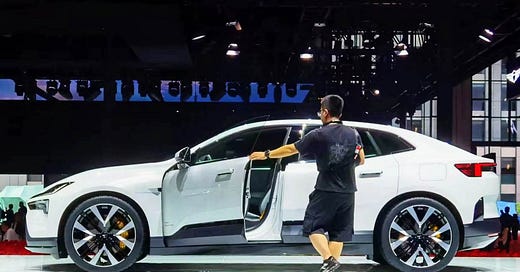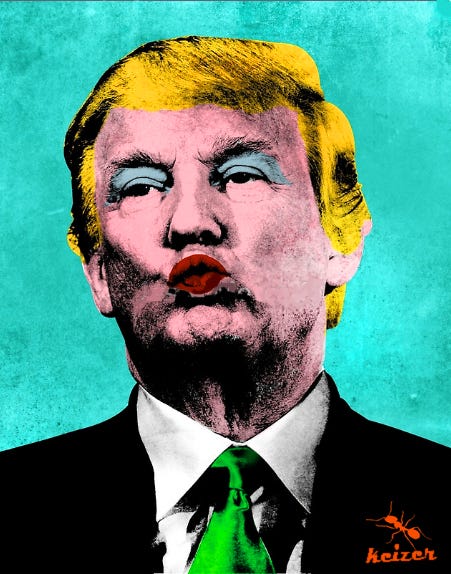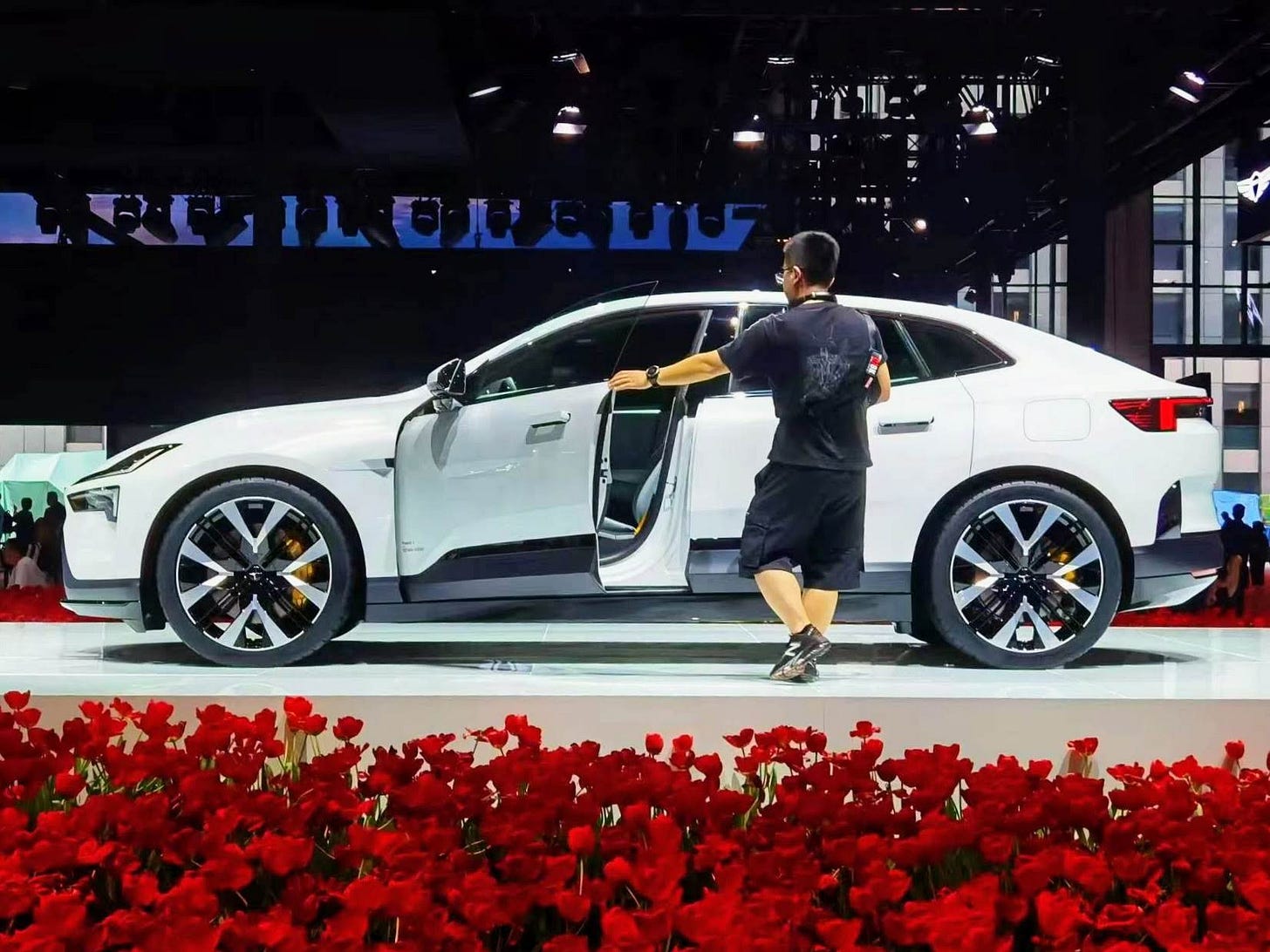5th November 2024. Autocrats | Cars
‘An extraordinarily powerful class of rich men who want influence on a global scale.’ // The decline of the car show [#613]
Welcome to Just Two Things, which I try to publish two or three times a week. Some links may also appear on my blog from time to time. Links to the main articles are in cross-heads as well as the story. A reminder that if you don’t see Just Two Things in your inbox, it might have been routed to your spam filter. Comments are open.
1: ‘An extraordinarily powerful class of rich men who want influence on a global scale.’
I have a soft spot for Fiona Hill, who grew up in an ordinary household in the north-east of England and ended up via a Russian degree at St Andrew’s1, and a few other things, working in the White House. Perhaps my soft spot is because she comes from the same town that my great-grandmother lived in for most of her life.
Specifically she ended up working in the Trump White House, although like so many other people who worked for Trump she is no longer a fan of the former President. Politico chose this moment to do a long interview with her on the drift of the American system towards autocracy, and the relationships between the world’s autocrats. (The interview was forwarded to me by a client).
Thinking about Trump and Putin and Musk as fellow oligarchs helps explain why they all seem so enthralled with each other. As Hill noted, they are part of a very small group of men who control vast fortunes and vast political power that have global reach, and who prefer to deal with each other.
“They aren’t driven by the people they represent or the companies that they represent, but by the peer group that they are in, which is an extraordinarily small group of people,” Hill told me. “Their interactions are all about them figuring out how to exercise power together.”
The interview proper starts with the various revelations that Trump has been in touch with Putin on multiple occasions since he left the White House, and similarly that Elon Musk is in touch with the Russian President. Trump talks about this as if it’s just a matter of having a chat to sort things out: Hill is sceptical:
[W]e know through historical precedent and recent practice that just having a good relationship with the top leader of a country doesn’t always result in the good outcomes you’d want to see.
And, of course, Russia has said repeatedly during the war in Ukraine that it considers itself at war with the US, with the support of a number of countries who do not wish the US well, such as China and North Korea:
[W]e have a former president, perhaps a future president, who is focused on his personal relationship with Vladimir Putin, and not on the actual circumstances of what’s going on in the relationship between Russia and the United States. Putin has made his interest in the United States crystal clear... What he wants is the weakening of the United States. He wants the United States out of international affairs... Putin doesn’t care about the American people. He doesn’t care about President Trump. What he really cares about is Russia’s own positions and his own interests.
This sounds like the most obvious of points to make, and so I suppose it says something of our times that it needs to be said out loud.
(Donald Trump, 2017. Image by Keizer Keizer/flickr, CC BY-NC 2.0)
From Putin, the interview turns to the subject of Elon Musk. Hill says:
People are always asking, ‘Why does Trump admire Putin?’ One could also ask, ‘Why does Trump admire Musk?’
This could conjure up images of ‘Mrs Merton’ (the late Caroline Aherne) asking Paul Daniels’ partner Debbie McGee, “So what attracted you to the millionaire Paul Daniels?"
Because so far, Elon Musk has contributed something more than $100 million to Trump’s campaign, at a time when it was struggling—in comparison to the Harris campaign—to raise finance. Musk is almost certainly the largest single campaign contributor. But perhaps there’s more to it than that:
Musk and Trump both see themselves as members of an extraordinarily powerful class of rich men who want influence on a global scale.
But Hill’s perspective on Musk goes further: he’s got more influence, and more sway, than the oil barons for the gilded age:
Musk is something that we’ve never really seen before. People refer back to the Rockefellers and Andrew Carnegie and the robber barons of the Gilded Age, or the billionaires that emerged in Russia in the 1990s and 2000s. Musk is beyond that in his wealth and influence. He’s on track to become the world’s first trillionaire. His personal wealth is about the same as a medium-sized country.
Hill says that for Musk this is about business, (although I suspect that there’s a bit more to it than that). But it’s certainly partly about business. His satellite company Starlink needs a global network of relay stations:
Understandably, for Musk, he’s hoping to get something out of Trump, out of Trump’s success in the elections in terms of his own businesses. But he’s also hoping to get something out of Putin as well. For Elon Musk, for Starlink and also for SpaceX, he needs access to terrestrial relay stations across the whole of the planet, including Russia and China and all of the larger territories... We’ve seen that Russia has the capacity to destroy satellites in space and avoiding this outcome is Musk’s bottom line in his interests.
Hill suggests that although Musk is based in the US, and indeed has profited hugely from American government contracts, he’s operating at a global scale. More than this, however:
He seeks to not just get contracts from the state, but to try to capture the state, which is, frankly, what he’s doing in supporting Trump’s election.
Trump, on this reading, is a pathway to power: a $100 million dollar bet, which is a drop in the ocean when you’re as rich as Musk is. It’s a long interview, and I’ll come back later this week to the section where she talks about how oligarchy works—how it arrives—in a society like the United States, partly because I think that is a question that will survive the outcome of this week’s Presidential election even if Trump loses.
In the meantime, though, this last thought: that we’re seeing the emergence of a different kind of political economy:
We’ve seen the capture of the Republican Party by what is a pretty revolutionary faction. And now we’ve got a fusion between Trump and Elon Musk, someone who’s pretty revolutionary himself, including in the scale of money that he has at his disposal... In other words, we’re witnessing a fusing together of something that’s revolutionary in the economic sphere with something that’s revolutionary in the political sphere. People need to decide if they want to live in a U.S. version of an oligarchy, whether they want us to go down the same kind of path as Russia.
2: The decline of the car show
In n+1 Mark Krotov has just published a review of this year’s New York auto show, even though it happened several months ago. No matter. It’s given him a chance to think about the event a bit, rather than just talking about cars.
The first thing he notices is the absentees. He has been attending auto shows for 30 years now, since the early ‘90s, and in those days it was more important for car companies to be there:
As customers do more and more exploratory browsing online, carmakers are increasingly reluctant to allocate their marketing budgets to labor-, transportation-, and swag-intensive events. Floor space is expensive; hashtags are cheap. Stellantis had an outdoor Jeep test track but was otherwise absent at NYIAS this year — no Chrysler, Dodge, Ram, Fiat, Alfa Romeo, or Maserati — and two of the three major Germans (Mercedes-Benz and BMW) were entirely absent, which would have been unimaginable even a few years ago.
The media coverage is also a good deal thinner, which is partly because the media world is a good deal thinner, and of course this may also be directly related to the auto company absentees. Car shows are no longer good guarantees of free media:
Auto shows used to be major media events. Local and national TV networks still show up to deliver low-energy live coverage, but the automotive magazines have thinned out and newspaper car critics are an endangered species. In their absence an esoteric community of amateurs has stepped in: TikTokers, vloggers, n+1 editors. Watching the vloggers at work called to mind firefighters rescuing a single cat from a tree or PACs spending millions of dollars on a local election — instances where effort and outcome are irrevocably mismatched.
What’s happened in that 30 years is that cars have become technically better, and the industry has become more concentrated, with more companies sharing parts and vehicle platforms. Regulation is tighter than it used to be. One result is that cars have become increasingly similar to each other.
One of the consequences of this is the decline of the car nerd, who might once celebrate the MG or even the Saturn. Only Tesla excites this kind of excitement these days, but Tesla hates car dealers and so was never going to appear at an event organized by the Greater New York Automobile Dealers Association (GNYADA). Krotov is pleased: it’s hard when you write for the left-wing n+1 to write about Tesla dispassionately, given the baggage that comes with the company.
Tesla, all the same, seemed to be living rent-free in the heads of some of the exhibitors. Honda, for example, introduced its Prologue model by emphasising
the model’s retractable panoramic sunroof, throwing shade (and shade) at Tesla’s unyielding, overheating-prone glass version of the same. The sunroof, the guy said, was “one of my favorite things about Prologue.”
The car industry loves to boast about size, and here the car companies were boasting about the size of their digital screens. Krotov is a fan of Kia, although he describes the Kia K4, on display here, as “heroically ugly”:
Over and over again I heard about the width of various digital instrumental panels, possibly the saddest example of dick measuring I’ve encountered in an industry permanently committed to the practice. (The K4’s screen is thirty inches wide, if Big Display Energy is the sort of thing that gets you going.)
In intriguing contrast, in some kind of retro analogue approach to new car design, Hyundai was zigging rather than zagging:
Randy Parker, the CEO of the company’s American division, announced Hyundai’s “all-new human-centric technology”: the “return of some of those knobs and dials” that nearly every brand — other than the noble anti-touchscreen holdout Mazda — has renounced over the past few years.
Of course, no-one in the car sector is arguing about electrification any longer. They’re all in. All the same, some are more enthusiastic than others:
Polestar’s Thomas Ingenlath — a kind of Germanic Tom Cruise — was unreservedly excited about the electric future. While the other manufacturers suppress the political-environmental implications of their electric vehicles, Polestar — a Swedish company owned by Volvo — labels its seats with sans-serif details about the carbon footprint of its fabrics and the assertion that “animal welfare [has been] secured.” This is smug, probably effective, and made me feel like I was sitting inside a bottle of Aesop hand lotion.
(Polestar 4. Photo by maxhdtende/wikipedia, CC BY-SA 4.0.)
The Polestar has eliminated the rear window, and also the rear-view mirror, which has been replaced by a camera linked to a screen. Maybe it’s my age, but I can’t start to say how uncomfortable this made me feel. Because nothing ever goes wrong with electronics on a car.
If his first day at the event was about the cars, the second day was about all the rest of it—hanging with what he calls the “bureaucrats” in the basement conference suite. He likes the bureaucrats, and he clearly shares their frustrations.
Jennifer Homenedy, the chair of the US National Transportation Safety Board, speaks of recent fatal crashes, involving multiple deaths, caused by a combination of speed and alcohol, and points out that they could have been prevented by existing technologies such as intelligent speed assistance, and passive alcohol detection technology.2 She also talked about the weight of electric vehicles—often 30% heavier—but was more concerned by their impact on road surfaces than on walkers or cyclists.3
Krotov says somewhere in the piece that he’s unlikely ever to be able to afford a luxury car, or even a new car, but he gets indignant when he realises that there’s no technical reason why the safety features that manufacturers add to luxury vehicles—automatic emergency braking, forward collision warning—can’t be added to all cars.
And what he takes away from the show is the problem of size: American vehicles are getting bigger and bigger, and technology makes them drive more and more easily. On a recent trip, he’s been upgraded by the hire car company:
At nearly six thousand pounds [2.7 tonnes], the [Chevy Tahoe] was smooth and nimble: easy to accelerate, easy to steer through the Taconic State Parkway’s precarious curves. It was also easy to forget the smaller and more vulnerable cars — and their passengers — in the other lanes. I don’t think any of this constitutes progress. Size inflation has been so normalized that it’s almost impossible to appreciate the enormity of American cars.
There’s lots of rational reasons for this: the desire for status, a projected sense of safety, a regulatory regime in the US that made it rational for car manufacturers to build bigger vehicles. He thinks all of these things are factors:
But we shouldn’t underrate, as an explanatory factor, the desire to wall oneself off from the world, to float above degraded infrastructure and the threat of violence even as one contributes to both.
j2t#613
If you are enjoying Just Two Things, please do send it on to a friend or colleague.
From her Wikipedia entry: "I applied to Oxford in the '80s and was invited to an interview. It was like a scene from Billy Elliot: people were making fun of me for my accent and the way I was dressed.“
In California Governor Gavin Newsom has just nixed state legislation that would require new cars to be fitted with ‘intelligent speed assistance’, which beeps at you when you’re going more than 10mph faster than the speed limit.
The impact of a vehicle at a given speed is the fourth power of its weight: a 30% increase in weight almost triples impact.





Well it seems like Elon Musk just bought America for 100 million dollars - much cheaper than Twitter… I think the decay to neofeudalism will get strongly underway now